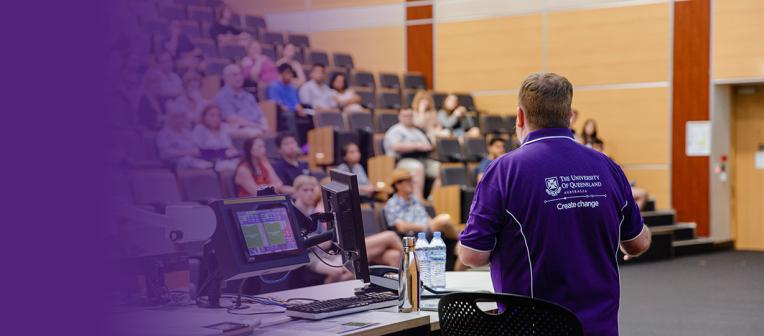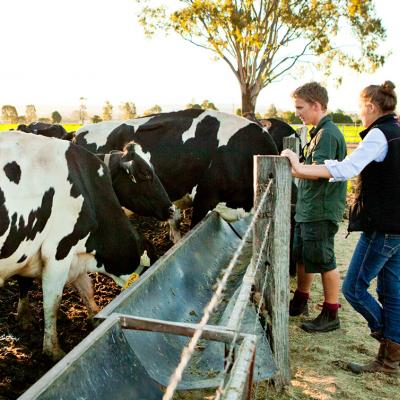Interested in higher education but worried about how to pay for uni? It's normal to wonder whether you can or can't afford university, but don’t dismiss it as a pipedream just yet.
We know attending uni comes with expenses - it's not just the cost of paying for a degree. There are tuition fees to consider, as well as outlays for textbooks and study materials, such as a laptop and stationery. Then there's the cost of transport to and from campus, and food while you are there. For some, there’s also the financial strain of relocating and paying rent and utility bills.
But financial help for uni students is available. If you’re concerned about how to afford uni, there are ways to make it work for you. This might mean looking for a scholarship, a student loan, or a careful work/study balancing act supported by student services. Whatever it is that gets you to uni and helps you thrive, the first step is finding out your options.
Here are a few of the main programs that can help alleviate the cost of living and studying, so you can kickstart your journey towards your dream job through higher education.
Scholarships
There are a range of scholarship opportunities, financial assistance schemes, bursaries and grants available for future and current students who think they can’t afford university. If you’re worried about the cost of tertiary study, it’s worth investigating which scholarships you might be eligible for.
Types of scholarships
Contrary to popular belief, scholarships are not only for academic or sporting excellence. At UQ, there are scholarships and grants for prospective and existing students who:
- live in regional, rural or remote areas
- identify as LGBTQIA+
- identify as Aboriginal or Torres Strait Islander
- identify as female and wish to study a STEM program
- are living with a disability
- are experiencing financial hardship
- are citizens of another country, wishing to study at UQ
- are non-school leavers/mature-aged
- come from refugee or asylum seeker backgrounds
- come from non-English speaking backgrounds.
Eligibility for scholarships can depend on study area, income, enrolment status, and level of study. Some scholarships include a living stipend, a financial award, or travel allowances. Each scholarship comes with its own unique set of eligibility requirements and terms and conditions.
Equity scholarships
If you’re experiencing financial difficulties that make it hard to afford university, you may be eligible for an equity scholarship.
You may be eligible for this type of scholarship from UQ (called The Queensland Commitment Scholarship) if you're an Australian or New Zealand citizen (or Australian permanent resident) and live in a household with a gross income less than $100,000 per year.
The Queensland Commitment Scholarship will help with financial costs while studying, providing $7,000 per year for the standard duration of your program.
To apply for this scholarship, you must indicate that you want to be assessed for the Educational Access Scheme – Financial Hardship category when submitting your QTAC application and place a UQ program in your preference list.
Finding the right scholarship to help you afford university
Whether you're an undergraduate, postgraduate or haven't started studying yet, there are several scholarships worth applying for. Many are offered by schools or faculties for specific study areas.
Explore UQ’s scholarships and use the filter function to find the best fit for you.
Most applications require you to submit documentation proving your eligibility for the scholarship, along with a personal statement. UQ has a series of application tips to help.
Are you an international student? There are scholarships available for you too. Learn more about the cost of study and find other international student support resources.

Tuition help
For domestic students, there are a series of government loan programs to help defer tuition costs. HECS-HELP and FEE-HELP are two such schemes.
HECS-HELP
Most undergraduate students in Australia are eligible for HECS-HELP, a government payment scheme that delays tuition costs. Notably, HECS-HELP covers the student contribution amount, which is the percentage of your course you are required to pay upfront.
HECS fees do not need to be paid back until after you get a job where you earn over a certain threshold each year (this is $67,000 for 2025-26). If you make less than this threshold, there is no expectation to repay your loan right away.
FEE-HELP
The main difference between FEE-HELP and HECS is that FEE-HELP is not subsidised by the government and has a set loan limit. Like HECS-HELP, however, it does assist with deferring tuition costs. A FEE-HELP loan is available to help pay part or all of your tuition fees when you attend university or another approved higher education provider.
In Simple Terms, HECS-HELP is for subsidised spots, and FEE-HELP is for full-fee spots; both let you borrow from the government to pay back later.
If you’re an Australian citizen, you may be able to receive FEE-HELP to cover your tuition cost. If you’re a permanent resident, you may be able to receive FEE-HELP on approved bridging courses.
Student loan conditions
There are some conditions to these loan programs:
- You must maintain a pass rate of 50% and be enrolled in a course at the FEE-HELP provider by the census date.
- But as long as you pass half your enrolled courses, you remain eligible for FEE-HELP and HECS-HELP.
- If special or personal circumstances impact you, your education provider can allow considerations for these conditions.
If you wish to receive FEE-HELP or HECS-HELP, you’ll need a Tax File Number (TFN) and a completed application form, available from your academic provider during enrolment.
HECS-HELP and FEE-HELP only cover tuition fees – these student loans do not cover things like accommodation, living costs, textbooks, and laptops.
Centrelink support
Centrelink offers a variety of government help schemes for students throughout Australia. If you’re worried you can’t afford student accommodation, you may be eligible for Centrelink payments to alleviate the cost of living while studying.
If you’re over 25 and a full-time student in an approved course, Austudy provides regular payments. Or if you’re under 25, Youth Allowance is available for a majority of approved undergraduate courses. Both programs help with the additional costs of living that HECS-HELP and FEE-HELP do not cover. These can be used in conjunction with scholarships, grants or other financial assistance received.
Working while you study
Another option if you feel like you can't afford university is to work and study part time. Part-time study covers the same areas and subjects, but courses can be taken over the duration of 6 to 8 years instead of the standard 3 to 4, to allow for work or life commitments. In some programs, there are external classes on offer to accommodate work schedules.
If you choose to pick up some casual or part-time work while studying full time, UQ students can access job listings, advice and services to help you find a job. Keep in mind that students are recommended to spend 10 hours per week studying for each course.
Your income from a job and your study load will affect Centrelink support such as Austudy and Youth Allowance. Always check the terms and conditions of your financial assistance programs.
Additional fees
Don’t let administration fees stop you from applying to study either. Most universities and higher education providers charge a Student Services and Amenities Fee (SSAF) each year to help pay for student services and organisations. But there are exemptions for this for exchange students and doctorate candidates, and the SSAF can be deferred with SA-HELP.
SA-HELP, much like HECS-HELP or FEE-HELP, is a government-provided loan to help assist eligible students with the SSAF, making studying at university more accessible for those who don’t have the ability to pay it upfront.
Student support
Want to talk to someone about your financial and study options? Please don’t hesitate to contact our support team. You can also access a variety of previously asked questions and general information on studying.





